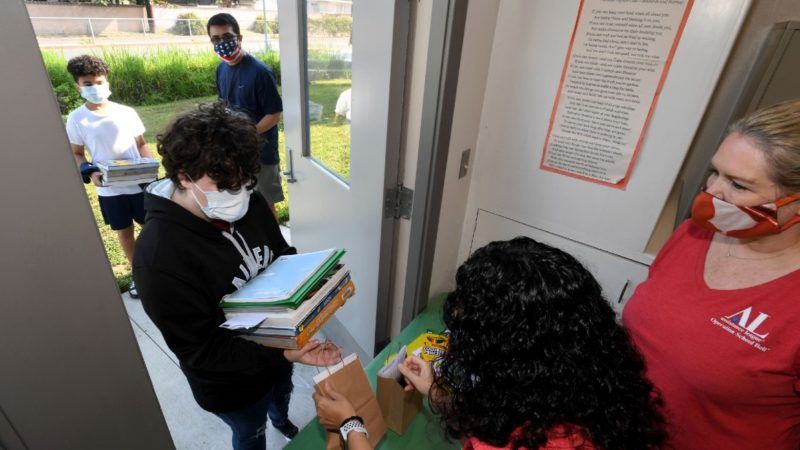Hispanic Parents Want More Choices for School
School choice programs can help Hispanic families ease their fears about the coronavirus.

Hispanic parents, like other parents, have concerns about sending their kids back to school. According to a poll by Latino Decisions, a firm founded by a Biden campaign operative, 59 percent of Hispanic households are "very concerned" that their kids could be exposed to the coronavirus at school; 52 percent expect to have technical troubles with online learning, 34 percent do not have access to high-speed Wi-Fi, and 36 percent "do not have anyone who can stay home" to supervise their children's online classes.
Although the data points to real difficulties for Hispanic families, the firm's proposed solution amounts to the usual big-government formulas that can exacerbate problems instead of solving them. Angela Gutierrez, an analyst at Latino Decisions, writes that the survey shows the need for more federal and state school funding, "so that students and teachers can make the most out of teaching and learning in this unique situation."
Just as higher health care spending per capita has not always translated into a better response to the pandemic, higher spending in education does not necessarily mean better results. According to the Reason Foundation's Corey DeAngelis, the U.S. spends $15,424 per child in the school system every year. Injecting more money into centralized school bureaucracies won't do much in itself to help working Hispanic parents who can't watch over their kids as they learn from home, or who can't afford the technological costs of remote schooling. But funding the families directly and letting them choose the schools their children attend could be a game changer.
Private and charter schools have adapted better to distance learning during the pandemic than their district-run counterparts, the data suggests. A survey by Ipsos Public Affairs found that, in terms of the introduction of new content, parent satisfaction, and weekly contact with teachers, private and charter schools proved far nimbler in adjusting to the new reality than the public sector. According to a Common Sense Media poll, 66 percent of privately educated children had "connected with their teacher once a day or more" versus only 31 percent of public school attendees.
In part, this divide reveals how private sector innovators had advanced in distance learning long before the pandemic arose. For example, institutions such as cyber charter schools already had years of experience in delivering a fully online education to students. This is an ideal option for parents who might prefer online learning yet struggle with its financial or technological components. As the Commonwealth Foundation's Marc LeBlond writes in the case of Pennsylvania, the state's 15 cyber charter schools "provide all the required equipment for learning, plus a stipend for broadband internet access." And, contrary to the claim that such assistance requires more funding, charter schools in Pennsylvania receive 27 percent less per pupil on average than district-run schools.
The main obstacle to increased enrollment in cyber charter schools is not a lack of funding or insufficient demand from families. It is lobbying by teachers unions intent on using their political clout to avoid competition. This has been true not just in Pennsylvania but in California, North Carolina, Alaska, and Oregon, where 1,600 students were prevented in March from enrolling in a cyber charter school.
And families who do want their children to continue their educations in person? In several states with large Hispanic communities—California, Florida, Illinois—powerful teachers unions have opposed reopening schools in many districts. Sometimes that is linked to other items on the union agenda, as when the pressure group Demand Safe Schools calls for a "massive infusion of federal money to support the reopening" and a "moratorium on new charter and voucher programs and standardized testing."
Yet school choice programs are just what many Hispanic families need if they are to send their kids to good private or charter schools while brick-and-mortar academies remain closed. They could even ease fears about the coronavirus, since parents could choose schools with smaller class sizes and more stringent health measures.
Latino Decisions has identified some of the challenges that Hispanic families must overcome in these difficult times. But the solution is not to strengthen the centralized bureaucracies that run traditional public schools. Sen. Rand Paul (R–Ky.) has a better idea: the SCHOOL Act, which would "allow federal funds for K-12 education to follow the eligible child, learning in person or remotely, to the school of their choice." That would go a long way toward giving Hispanic parents—and all parents—true power over their children's future.


Show Comments (29)